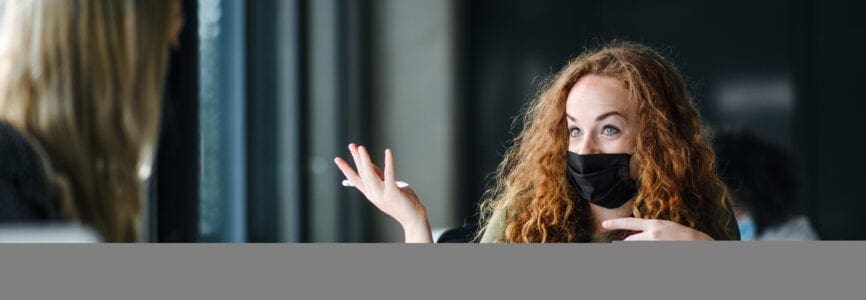Bioethics Forum Essay
Covid-19 and Deafness: Why the Protocols Fall Short
Masks have become required attire, and their importance in this pandemic cannot be overstated. However, while they protect against people breathing viral particles into the air, they also make lip-reading impossible. For me, communicating with someone wearing a mask is an exhausting struggle, because their lips, which I rely on very heavily, are not visible. I am hard of hearing; I wear two hearing aids, and Covid-19 has made all forms of human interaction extraordinarily difficult.
When school and work start, there will be further challenges of access for people with hearing loss. The solutions that have worked for the majority of people, such as wearing masks, social distancing, staying outdoors, and using Zoom, all have downsides for the deaf community. While clear masks make face and lip-reading more of a possibility, they often fog up and are expensive. Face shields are not recommended as alternatives to masks. Social distancing makes picking up sound even more of a battle than usual. Being outdoors can interfere with Bluetooth connections to hearing equipment, and weather creates other issues―most hearing technology cannot get wet, and wind hinders the ability of hearing aids to pick up and amplify the correct sounds. Zoom seems like it would be a better option given the full view of people’s faces, but, in reality, the audio and video are rarely synced well enough to allow for accurate lip-reading and the stringing together of verbal and visual cues. Additionally, Zoom only offers captioning services as a part of a package for companies and charges individuals after a 7-day trial period.
If strategists planning for Covid-19 containment had initially been aware of the struggles that these safety measures would create for the deaf community (among many others), there might have been mass production of clear masks. Captioning services could have been made available to all at no or low cost, and people might be more mindful of the stress caused to deaf people. The Americans with Disabilities Act secured some degree of accessibility, but generally speaking, this is a society in which stairs are the norm despite ramps and elevators being accessible to all. America is ableist in its infrastructure, its education and employment systems, and certainly in its social standards. The people with disabilities who most often overcome these barriers are those with the money and access to resources to do so. I recently bought hundreds of audio wipes to sanitize my hearing equipment and clear masks for all my professors, and I am working with the accessibility office at my college to make sure another student is taking notes for me, so that I will not miss anything important during classes, both in person and over Zoom. Money allows me to overcome these challenges and continue my education, but I am incredibly lucky to have that safety net. It is not fair to ask that people with disabilities pay extra to have the same opportunities for success that are available to people without disabilities. When addressing crises like Covid-19, we need to be thinking more universally.
Sophia Corwin is a sophomore at Vassar College. Twitter: @SophCorwin













Cogent and timely. In a small space, you’ve packed in a lot of information and made persuasive arguments for changes to address inequities in our culture/system. You have broadened my awareness. Thank you for this excellent essay.
This should be published everywhere. So important. Thank you for writing this article. You are also doing a tremendous service to Vassar. I hope other colleges follow suit.
Beautifully articulated. Thank you for shining a light on societal inequities in the time of Covid-19 and in normal times as well. It is so important that we think more universally!
Thank you for an important article. With respect to ZOOM charging extra for captioning, this would be in violation of Title IV of the Americans with Disabilities Act which states re services for the deaf (at that time TTY and TTD) that the ADA “… require that users of telecommunications relay services pay rates no greater than the rates paid for functionally equivalent voice communication services with respect to such factors as the duration of the call, the time of day, and the distance from point of origination to point of termination…” The FCC should regulate companies like ZOOM as clearly the stipulation was not only intended for the technologies of 1990 but those of today. The overarching goal of the ADA, and the subsequent ADAA, was to integrate people with disabilities into civil society and to provide equal opportunity for engagement. To charge extra for this opportunity constrains this, is normatively wrong, and likely illegal. I would urge all university users to join together and make accessing these services a priority for free, consistent with the law. A class action law suit might also be a good option with a Disability Rights legal advocacy group. Neither students nor their schools should pay for services that companies must provide under the ADA. Again, thank you for a wonderful entry.
Joseph J. Fins, MD, MACP, FRCP
Weill Cornell Medical College and Yale Law School